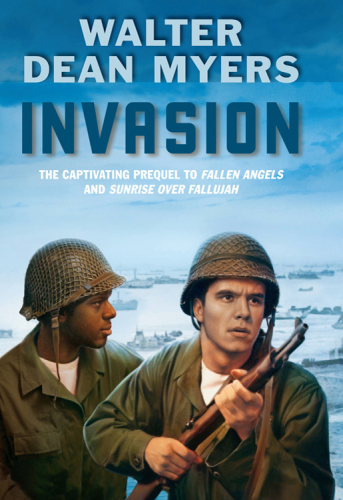
Invasion
فرمت کتاب
ebook
تاریخ انتشار
2013
Lexile Score
760
Reading Level
3-4
ATOS
4.9
Interest Level
9-12(UG)
نویسنده
Walter Dean Myersناشر
Scholastic Inc.شابک
9780545576598
کتاب های مرتبط
- اطلاعات
- نقد و بررسی
- دیدگاه کاربران
نقد و بررسی

July 15, 2013
D-Day, June 6, 1944, is the setting for Myers' powerful prequel to Fallen Angels (1988) and Sunrise over Fallujah (2008). Old friends Josiah "Woody" Wedgewood and Marcus Perry see each other in England prior to the invasion of Normandy. Woody is with the 29th Infantry, and Marcus, who's black, is with the Transportation Corps, the segregation of their Virginia hometown following them right into wartime. Their friendship frames the story, as the two occasionally encounter each other in the horrific days ahead. Woody survives the slaughter on Omaha Beach to continue marching across fields, through forests and on to the town of St. Lo, though there is no town anymore: "We hadn't liberated anything, or anyone. We had destroyed the city, killed or chased away most of the people in it, and were claiming a victory." Woody's first-person account focuses on action scenes, cinematically developed and graphic enough to reveal something of the brutality and frequent futility of war, while his friendship with Marcus, peripheral to the central narrative, reminds him of home. "June sixth changed us all," says Woody, and he understands that, if he survives, he will never be able to convey what war really is to those who stayed on the homefront. An author's note goes into greater depth about integration in the U.S. Army in the 1940s. An action-packed novel that will help young readers understand the brutality of war. (author's note) (Historical fiction. 12 & up)
COPYRIGHT(2013) Kirkus Reviews, ALL RIGHTS RESERVED.

October 1, 2013
Gr 8 Up- Invasion tells of the events of D-Day and the weeks immediately following from the perspective of Josiah Wedgewood, a young soldier in the U.S. Army's 29th infantry. Woody and his fellow battalion mates are only vaguely aware of what will be happening when they arrive at Omaha Beach. The landing, as history knows, is horrendous. Woody watches as dozens of his companions are killed. Immediately after, the men begin to fight their way inland. The action is nonstop and the losses are heartbreaking. The segregation of the U.S. Army is only lightly touched upon, as Woody runs into an African American he knew from his hometown; the majority of the novel is the 29th infantry's push across the French countryside. Myers eloquently conveys how exhausting war is physically and emotionally. He writes simple sentences that are often short, sharp, and blunt. The language is somewhat innocent, a bit gentler than what readers are used to now; but since it is a novel about war, there are some F-bombs and some earthy talk about bodies. Woody and his mates are thinking of home, while trying not to think in general. There is a subtle bit of reader manipulation; although the book is written in the past tense, the D-Day landing chapter is in present tense, adding to its tension. With the constant forward momentum of the soldiers, and the continuous battles they fight, this novel can be hard to read, but it is also hard to put down.-Geri Diorio, Ridgefield Library, CT
Copyright 2013 School Library Journal, LLC Used with permission.

Starred review from December 15, 2013
Grades 9-12 *Starred Review* It's June 6, 1944, D-Day, and 19-year-old Josiah Woody Wedgewood is part of the Allied invasion, huddled up with a group of other men against the cliffs on Omaha Beach. We are in a killing zone, he thinks in agony, and we are dying. All around him is a scene from hell: the beach filled with the dead and dying; more soldiers being mercilessly shot by the Germans as they attempt to land on the beach; the noise of war shots and explosionsso loud that Woody can't hear the screams all around him. I will never be the same again, he thinks. Myers' excellent prequel to his two other war novels, Fallen Angels (1988) and Sunrise over Fallujah (2008), charts the course of war in the month following the invasion as Woody, who tells the compelling story in his own first-person voice, and his comrades continue to fight through the countryside in pursuit of the Germans. The reader sees the fear, confusion, horror, and brutality of war through Woody's eyes. In a subplot involving Woody and his African American friend Marcus, the reader is also acquainted with the ugly segregation that was a daily fact of life during WWII. In this novel, Myers has done peace an inestimable service by showing so vividly what a truly terrible idea war is.(Reprinted with permission of Booklist, copyright 2013, American Library Association.)

























دیدگاه کاربران